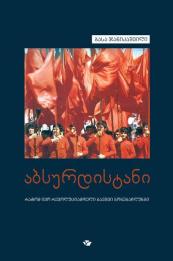ABSURDISTAN
JANIKASHVILI BASA
Absurdistan Sovieticus is a land where everything is absurd: music, entertainment, life itself. This country has existed, and may still exist anywhere that the word ‘freedom’ is heard. One of the most thoroughly free manifestations of freedom in the twentieth century is rock music: the civilised world has had it since the 1960s. It was one of the western ‘sicknesses’, which made the Soviet Union very worried because of its boundless influence on people. The main character of the book is rock music itself, but this is not western rock: it is rock in Soviet Georgia, illegally recorded from radio broadcasts, imported, and disseminated by pirating, a phenomenon associated with freedom and which meant far more than music to Soviet music-lovers. ‘The KGB knew who had videos, what films citizens were watching, and cut off the electricity at the entrance to blocks of flats. It’s easy to understand that a video would stop and any pernicious illegal film or porn would be left on the video recorder. Then the secret police would come in and, with just a click on a button, would have evidence of an illegal performance in a Soviet citizen’s apartment. One more thing: there was a myth about operational methods of combatting these things. A rumour spread around town that there was a special Japanese video recorder which, whenever the electricity went off (or was deliberately cut), would go on working for several minutes, so that the owner could calmly conceal his forbidden films. I don’t want to leave young people with the impression that all of Transcaucasia was reared on pornography. The prohibition extended to karate, too, as well as the rock concerts I’ve mentioned…’ This is an extract from Basa Janikashvili’s novel, which is autobiographical and devoted to music, or, to be specific, to rock and politics. In Soviet Georgia of the 1980s and 1990s this movement was no longer forbidden, although finding good recordings is no easy matter now. Music-lovers have ‘sweated their guts out’ for such things, but have had no luck. Our author calls the country as it was then ‘Absurdistan Sovieticus’, and it went on being absurd, and for many people existence carries on being absurd. Because people live by pseudo-values and pseudo-feelings, they listen to pseudo-music and enjoy a pseudo-freedom. The road to Soviet and contemporary Absurdistan Sovieticus passes through the times of the author’s youth: we learn about the development of rock at the same time as life then, with its interesting details.
Extract will be available soon
In case of using the information, please, indicate the source.
‘Basa Janikashvili has brought into his book almost everything that has happened to him and his country over the last twenty years, and has tried to use a very simple, elementary language to talk about simple or funny, open or covert enthusiasms, situations in which he personally found himself, and about the people he met. All this is unified by music, contemporary pop culture, which imbued all our Soviet childhood, but turned into a powerful torrent from the end of the 1980s onwards. Basa’s book deals with this period in particular, and he is one of the very first to devote a novel entirely to a popular subculture.’
M. Kharbedia, author, literary critic / Radio Liberty
Extract will be available soon
In case of using the information, please, indicate the source.
